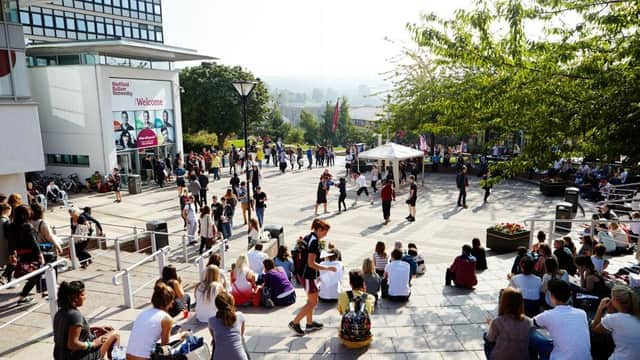Northern Lights: The UK has outstanding universities and a great history in educating people


This would, in my view, be a terrible mistake that would have a profoundly negative impact, not just on universities but on our city and our society as a whole.
Sheffield Hallam currently educates something like 4,500 overseas students. That means that international students make up about one-sixth of our overall student population of nearly 35,000. Every year we welcome students from over 70 different countries from across Asia, Africa, the Middle East and Europe. The majority are studying postgraduate degrees or undertaking postgraduate research.
Advertisement
Hide AdAdvertisement
Hide AdThere’s always been a challenge about including international students in immigration statistics. It’s obvious that students come here to study and will return to their home countries where they will take what they have learned and apply it. And let’s be frank about this: there are other destinations – whenever the UK government examines its visa regime for students, university leaders in Canada, Australia and the United Sates rub their hand with glee.
Nonetheless, last year’s figures indicating that immigration into the United Kingdom had reached half a million, has led the Home Office to turn its attention to international student visas and suggested that the numbers should be sharply cut, either by restricting student visas to a few universities or by putting tight restrictions on student visas. But this would entirely misunderstand the enormous economic, cultural, and social contribution international students make to the United Kingdom.
It’s a crude measure, but the estimate is that international students make a national economic contribution upwards of £30billion – or, putting differently, 20% of the NHS budget. Closer to home, Sheffield Central is the parliamentary constituency which experiences the biggest net economic impact. The economic contribution of international students from the city’s universities is estimated at almost £300 million. The impacts are lower in other parts of the region, but even in constituencies as far from the centre of Sheffield as Barnsley Central or Wentworth and Dearne the benefits are above £15 million a year – more than the government’s levelling up funds are spending in those places.
But it’s wrong to limit the contribution of international students to economic measures. They make our universities culturally richer places, in which students from quite different backgrounds work, learn and live together. And in many cases, it is international student recruitment which makes highly specialist post-graduate provision economically viable, in disciplines such as advanced computing, public health and international finance. The city’s universities are globally connected institutions, and that works for the benefit of students and the city.
Advertisement
Hide AdAdvertisement
Hide AdThe government does have an official policy – and one at odds with the Home Office’s current thinking. It’s international student strategy encourages continued growth in international student numbers. As I’ve already set out there are good cultural and social reasons for that. Strong international student recruitment extends opportunities for UK students: the courses which would not be financially viable without robust international recruitment, the way the community is strengthened by diversity. In every university in the country, international students broaden horizons and reach. And, as we have seen for the last hundred years or more, the opportunity to play a part in educating the next generation of global leaders gives the United Kingdom an exceptional edge. This is a story often repeated in the examples of former international students who go on to lead their nation’s governments, but it plays out at every level: future headteachers, future healthcare leaders, future industry leaders, future community leaders.
We live in a globally inter-connected world. In that world, senior university staff have been making the positive case for international students in recent weeks including my Sheffield Hallam colleague, James Richardson, our Director of Global Partnerships.
He talked to the Financial Times in November about the likely damage to the UK’s reputation in the global market of ill-thought-out policies. As he said, “other countries will jump in on this. They have a plan to increase international student numbers. We are one of their main competitors.”
The UK has outstanding universities and a great history in educating people from around the world; as the world becomes yet more connected, it would be tragic if we turned away.